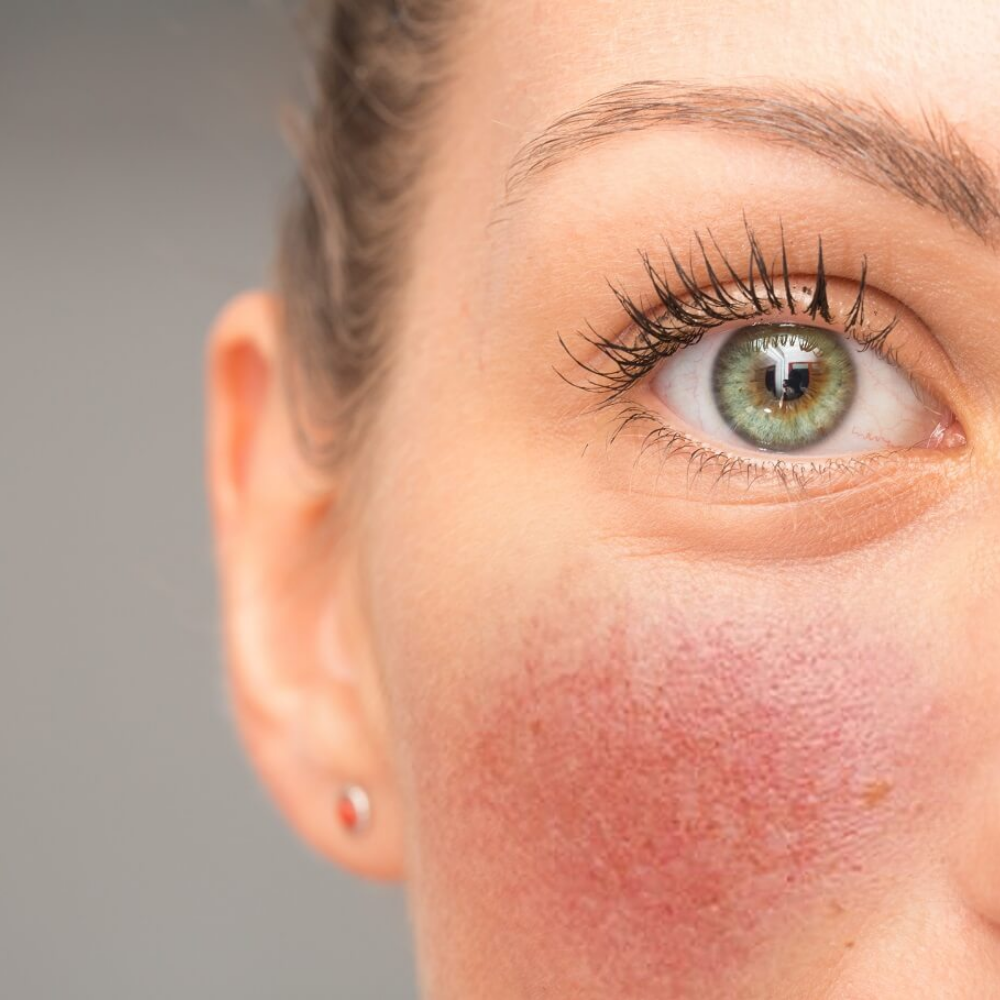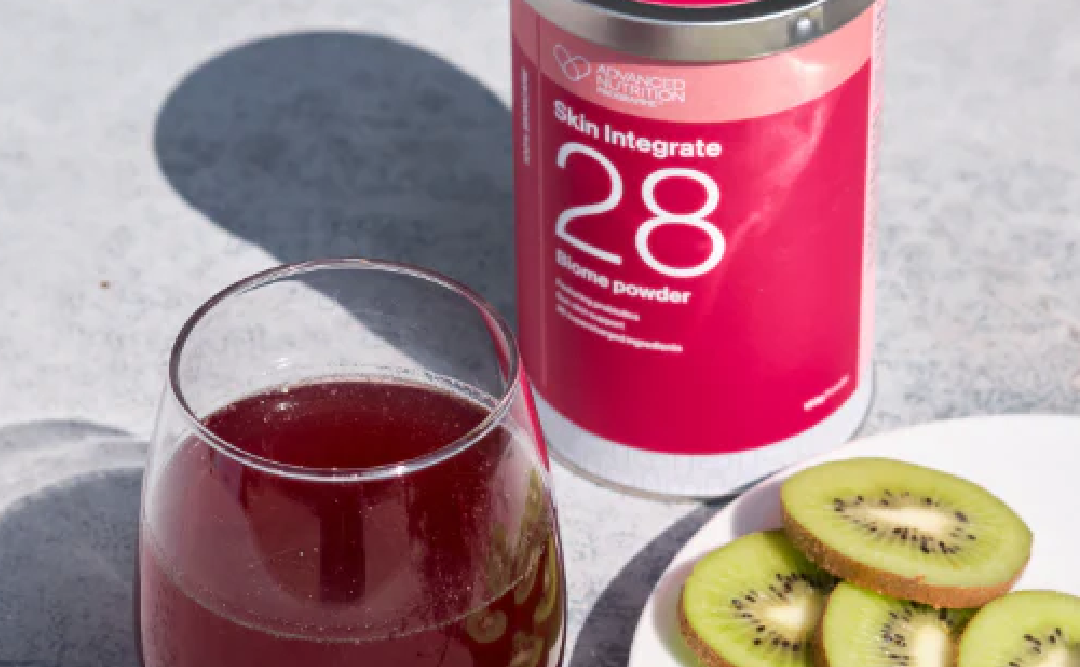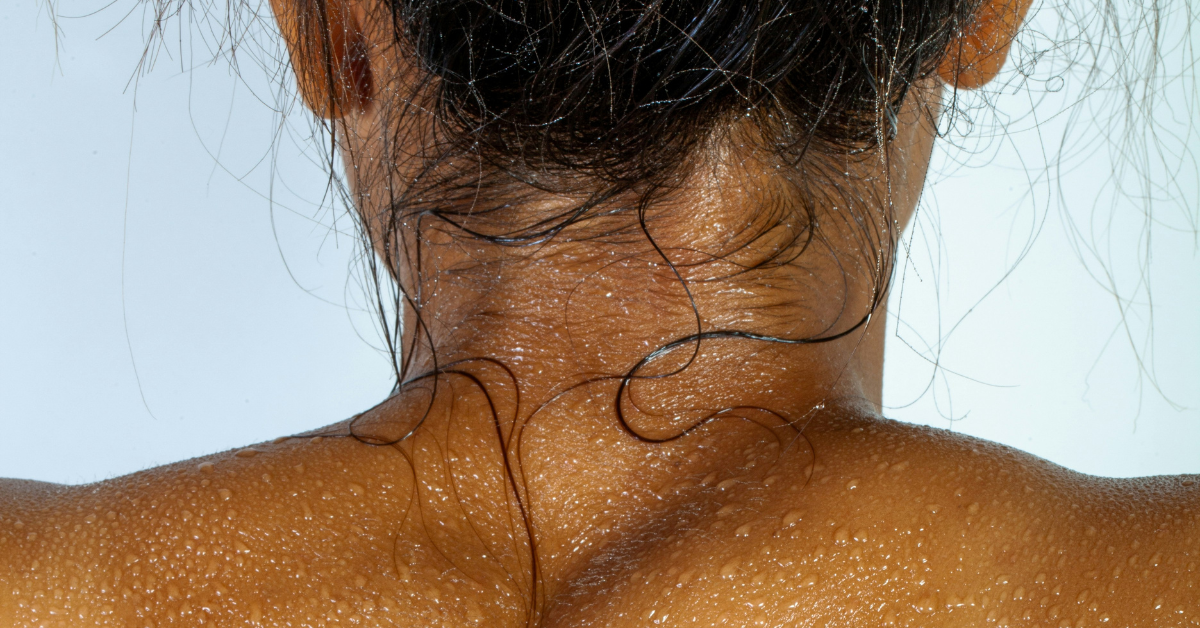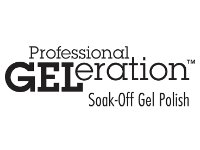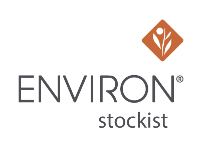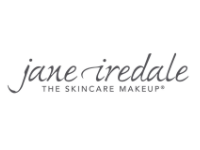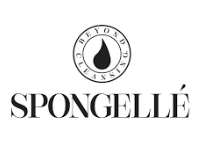The impact on self-esteem and quality of life from Rosacea can be profound for so many of our clients. The condition can be painful, tiresome and confidence-destroying. One in ten people in the UK and Ireland are affected by Rosacea, with women tending to be more affected than men. Many believe it’s untreatable or that certain lifestyle changes won’t make a difference. However, this couldn’t be further from the truth. While rosacea may not have a definitive cure, there are numerous ways to manage its symptoms effectively. The key with Rosacea is working out your own triggers so that you can avoid them. The main triggers for most sufferers are spicy foods, certain skincare, and in particular UV rays ie. sunshine, and not protecting your skin adequately from those rays. Combining knowing your triggers, with a correct skincare regime, can mean that your Rosacea can be controlled.
What is Rosacea?
Rosacea is a chronic inflammatory skin condition that primarily affects the face. It often appears as:
- Visible permanent redness.
- Sporadic and frequent red flushes and/or blushing.
- Stinging, burning and heat sensation on the skin.
- Spots (pustules and papules).
- Broken capillaries particularly on and around the nose, apples of the cheeks and chin.
- Sensitive skin.
- In severe cases, thickened skin.
- Notable swelling of the skin can also take place.
- A lesser known symptom is that approximately 50% of sufferers suffer with eye issues – particularly the eyes being bloodshot or watering.
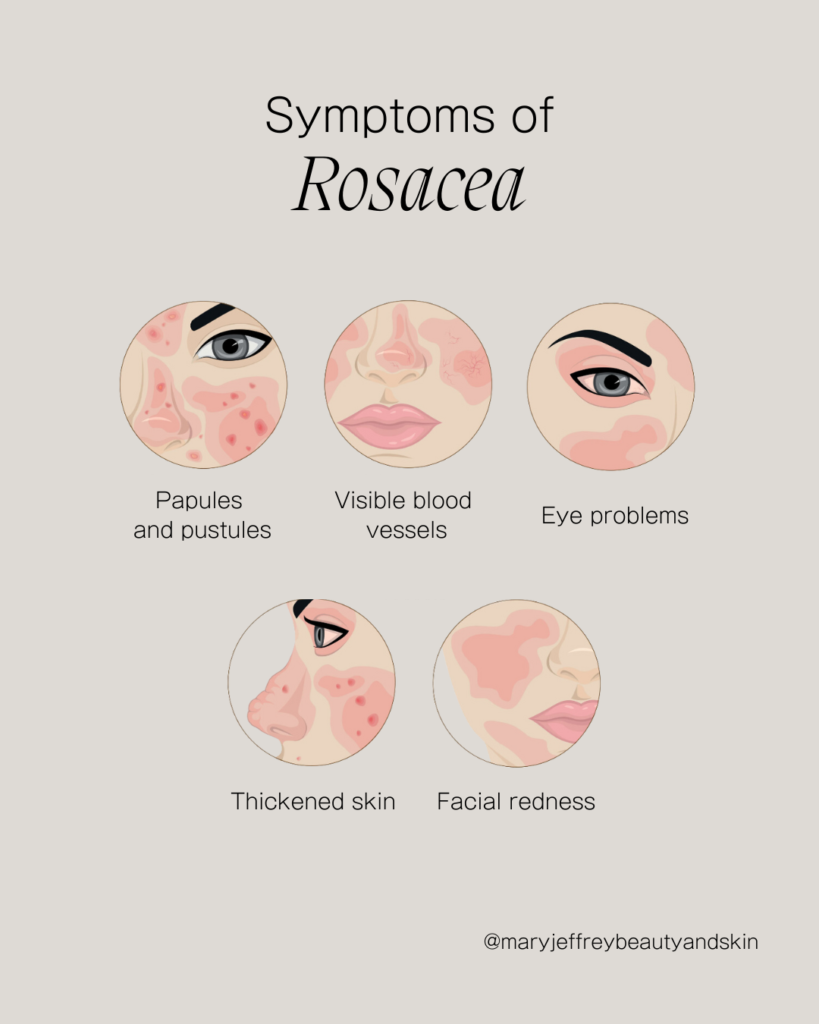
The differing symptoms, causes, and misconceptions about the condition mean that it can be a mistifying condition to its sufferers, with them struggling to know how to treat it, what products to use or what’s causing it.
The different types of Rosacea
It’s not fully understood what causes it or triggers it, its genetic, immune system and environmental factors. No clear link to it being hereditary but it does tend to run in families. There are four types of Rosacea, all with definitive characteristics. You can have a mix of two or all of them of the types, or just one of them.
- Phymatous Rosacea
This is the Rosacea that causes the classic thick red ‘whisky nose’ associated with older men, with it’s main characteristic being thickened skin. As it thickens and becomes inflamed, it creates scar tissue. Is normally discoloured and appears quite red on the skin. - Erythematotelangiectatic Rosacea
Causes dryness and inflammation. This version of Rosacea is where the blood vessels swell up, so it can cause quite a bit of redness on the skin. - Papulopustular Rosacea
Commonly known as the acne rosacea. Sufferers can get whiteheads, pustules, papules, blemishes, skin can be red and swollen, with any redness on the skin taking a long time to lessen. - Ocular Rosacea
This is where the eyes are affected – causing them to be watery, bloodshot, and irritated.
What causes Rosacea?
While its exact cause remains unknown, inflammation is a huge cause of rosacea. It and conditions similar are a sign that your skin is dysregulated in its inflammatory responses. Inflammation can be triggered by various factors such as:
- Personal triggers
- Hormonal imbalances
- Immune system dysfunction
- Abnormalities in blood vessels
- Environmental factors
- Genetics
- Microscopic mites called Demodex mites have also been linked to the condition, particularly Papulopustular Rosacea. These mites live on everybody’s skin however studies have shown that Rosacea sufferers have a large amount of them on their skin.
The main thing with this condition is working out your own personal triggers as no-ones are the same, and they tend to be the main aggravator of a flare up.
Triggers for Rosacea
The main triggers for Rosacea are:
- Heavy exercise.
- Extreme weather such as strong winds, sunshine and humidity.
- Food, drink and alcohol, for instance spicy foods is a common trigger.
- Stress and anxiety (which cause a cortisol inflammatory response).
- Certain skincare products.
- UV rays.
- There is also a huge link between peri-menopause/menopause and Rosacea. Hormonal changes common in menopause can affect the skin itself, for instance the reduction in oestrogen actually reduces your skin barrier function. This can then lead to a disrupted skin barrier and skin which is more prone to irritation, inflammation and sensitivity.
Embracing a Holistic Approach
Successfully combating rosacea often requires a holistic approach that addresses both physical, emotional and internal aspects. Here’s how we help our clients tackle Rosacea:
- Keep a Trigger Diary: Note down what you eat, drink, and your activities each day to identify triggers that exacerbate your rosacea symptoms.
- Gentle Skincare Routine: Avoiding harsh chemicals, abrasive scrubs, and alcohol-based products can prevent further irritation, however the best action is to get a tailored skincare regimen prescribed to you.
- Sun Protection: SPF is a must with Rosacea as UV tends to be one of most people’s triggers. We always recommend Environ RAD Shield Sunscreen as it is mineral based which can soothe Rosacea, versus chemical-based sunscreens which can sometimes irritate already inflamed skin.
- Mindful Makeup Choices: Look for makeup products specifically designed for sensitive or rosacea-prone skin. Mineral-based foundations and powders can help camouflage redness without exacerbating irritation. We recommend Jane Iredale’s Powder Me SPF as it has mineral protection as well as Zinc which is anti-inflammatory and healing for the skin.
- Stress Management: Practice stress-reducing techniques such as deep breathing, meditation, yoga, or tai chi, as stress can trigger rosacea flare-ups in some individuals.
- Avoid Extreme Temperatures: Extreme temperatures, whether hot or cold, can aggravate rosacea symptoms. Try to stay in a comfortable environment and avoid prolonged exposure to hot weather, saunas, steam rooms, or overly heated indoor spaces.
- Consult with a Skincare Expert: Consulting with a skin expert can be key to helping Rosacea, as it is a difficult skin condition to manage, and a normal person’s knowledge of skincare as well as social media disinformation, means they often choose the wrong products and can in fact further inflame their skin.
The Environ A C and E Body Oil and the Environ Alpha Hydroxy Derma-lac Lotion is our power couple for skin conditions – it’s so much more than a body range and can be used on the face to treat Rosacea.
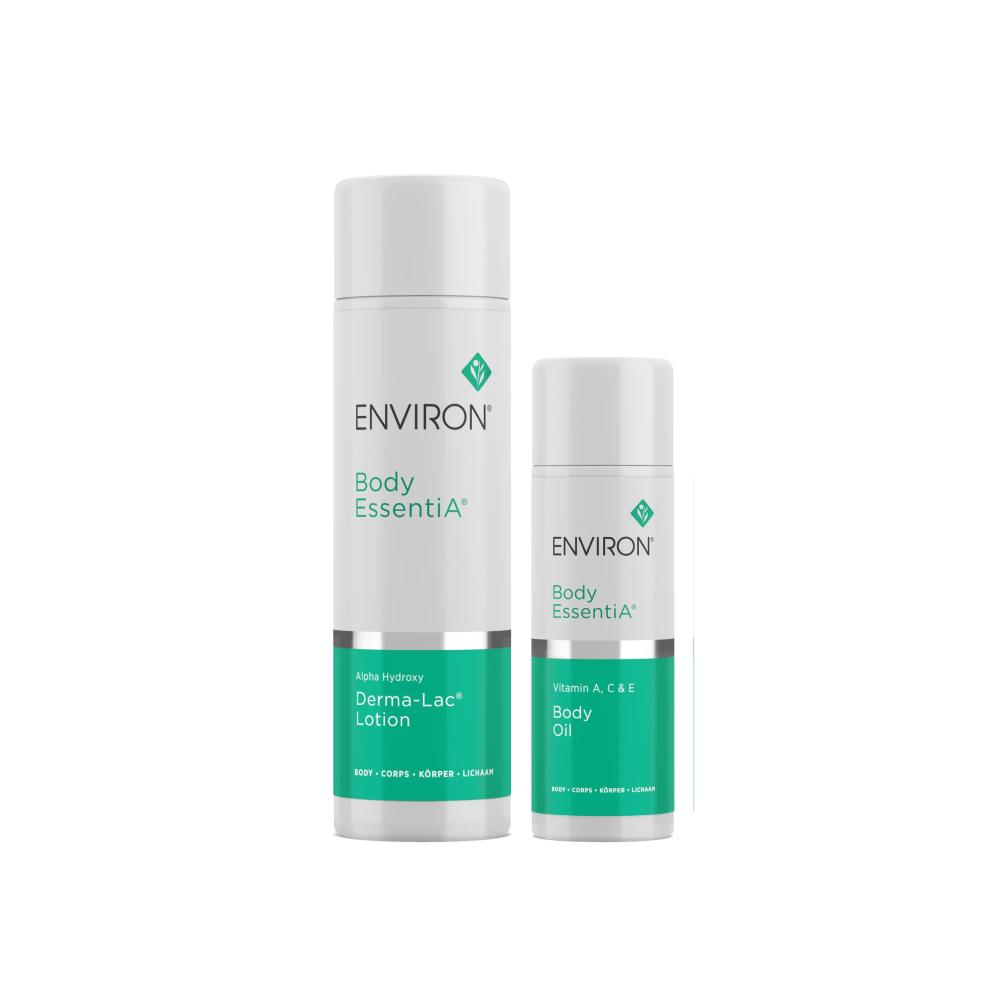
SPF is a must with Rosacea! The Environ RAD Shield Sunscreen is great for Rosacea as it is a mineral sunscreen with no chemicals, as chemicals can irritate inflamed skin.
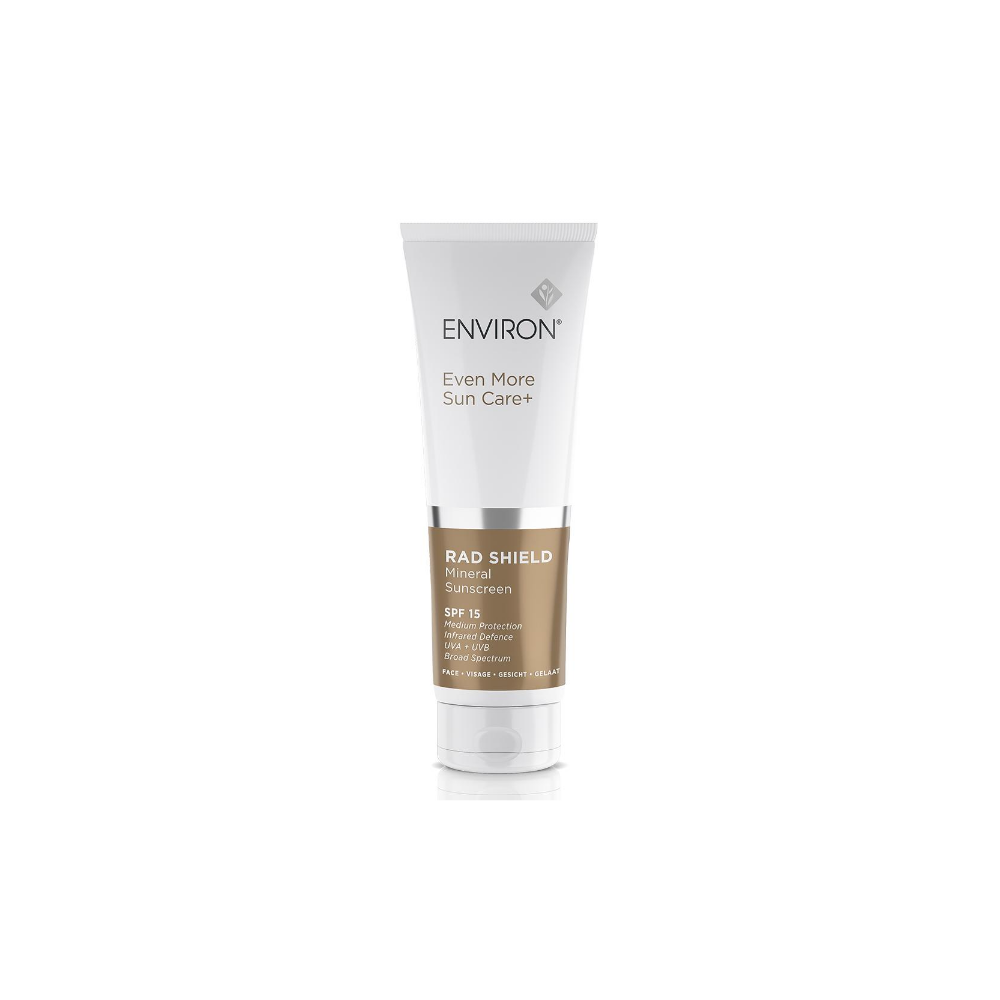
How you can help your Rosacea from the inside
As discussed above, working out your dietary triggers can be one of the best ways to control your Rosacea flare-ups. However there are also things you can consume to help with the condition.
- Experimenting with an anti-inflammatory diet: Making your diet rich in fruits, vegetables, whole grains, and lean proteins may also be beneficial – this is packing your diet full of antioxidants to help reduce the inflammatory side-effects of the condition.
- Staying hydrated: Drink plenty of water and eat vegetable and fruits with high water content such as courgettes and watermelons
- Taking supplements: There are many supplements that we prescribe that can greatly aid Rosacea and reduce the inflammation that it causes, with the choice of supplements needing to be tailored to each person.
Advanced Nutrition Programme Skin Omegas+ is a nourishing blend of Omega 3 and 6 fatty acids, plus vitamin A, which are all excellent for helping relieve the inflammatory issues associated with Rosacea.
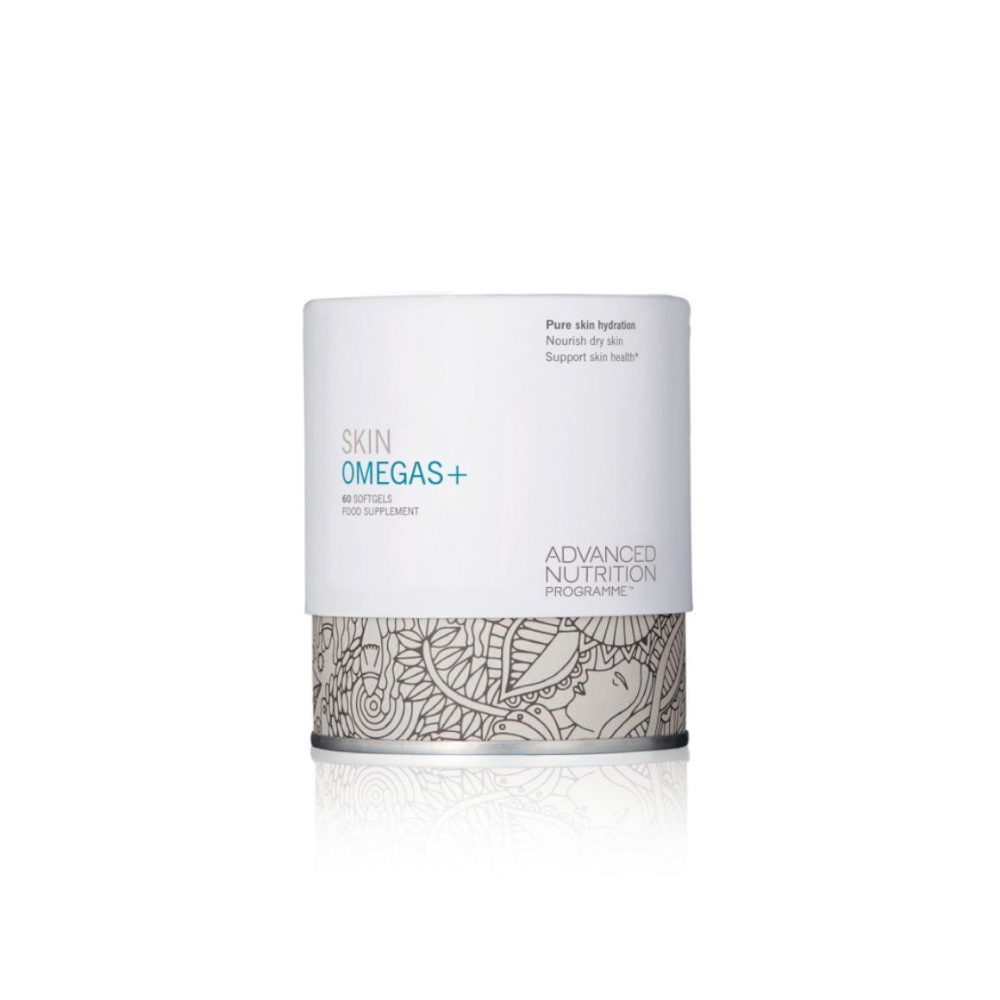
Treatments at MJs for Rosacea:
Our Environ TCA Cool Peels and Environ Lactic Acid Cool Peels both have Rosacea-focused peels – perfect to soothe, calm and restore sore and inflamed skin. Whilst skin will see an improvement after one session, it is normally at least course of 6 treatments that is required, with one a week for six weeks in order to see optimum results.
Controlling Rosacea takes time, but it is doable!
Conquering Rosacea is not a one-size-fits-all journey. It requires patience, persistence, and a willingness to adapt. By embracing a holistic approach, understanding triggers, seeking proper guidance, and fostering an empowering mindset, you can gain control over your skin and your lives. While Rosacea may present challenges, it doesn’t define who you are.
“I’ve seen first-hand the effect that Rosacea can have on its sufferers, which is why helping to control the condition is close to my heart as I know the difference controlling Rosacea can give to someone. This is the reason why I wanted to write this blog in hopes that we can help spread the message that Rosacea CAN be controlled, and you can make a difference to this relentless condition. We pride ourselves here at MJs with our knowledge and skills when it comes to treating Rosacea and other skin conditions, so if you choose us to help you on your skincare journey, you’re in safe hands with us.” Nicola Nally, owner of Mary Jeffrey’s.
If you would like to know more about a tailored skincare, treatment and supplement routine to help give you the tools to control your condition, then please don’t hesitate to get in touch with our Skincare Experts here at MJs. Follow us on Instagram or Facebook to see our advice and information about skincare and more.

